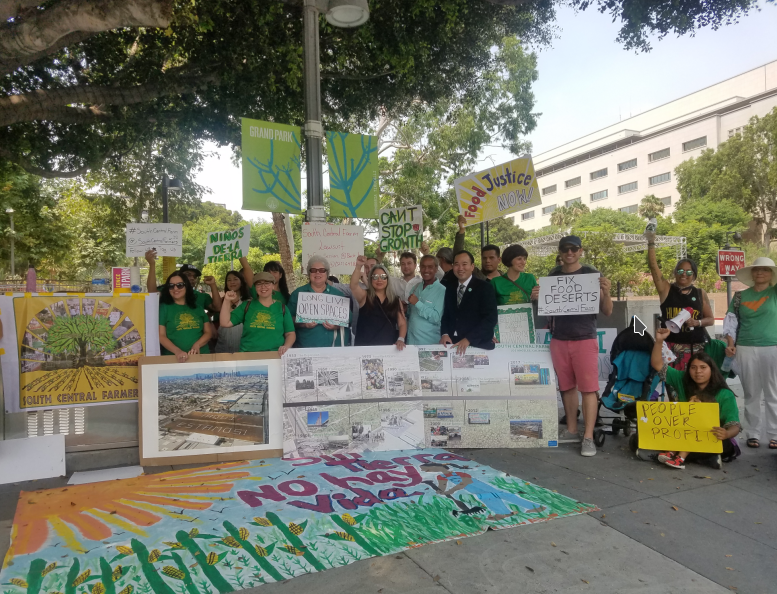
scfgroup3.pngiwpumu.png, image/png, 777x594
Judge: Environmental Impact Report of PIMA warehouses must be revisited.

scfgroup3.pngiwpumu.png, image/png, 777x594
Photo above courtesy of South Central Farm Restoration Committee
On August 9, a judge deemed that the City of Los Angeles and PIMA* failed to adequately address the environmental impact of traffic at their proposed warehouse facility (i.e.,the many trucks that would come and go each day). The warehouses are intended for land at 41st and Alameda where the South Central was demolished a little over 12 years ago (though as one supporter said, the spirit of the farm is still there), which still has not been developed on. And so,the issue will return to City Council**.
The Farmers would prefer to avoid conflict with PIMA and are prepared to purchase the land from them. “[W]e really want to talk to the owners and have them identify another site,” Rosa Romero told LA IndyMedia in late ‘16. “I'm not against their project; I think their project of 'made in L.A.' is a very worthwhile one; I think they have good plans—but just not on this site. This is one of the last large, undeveloped pieces of land in Los Angeles, and I think that we need to keep it that way and find a way to really make it a community place again. Our message to them is, 'Do the right thing: sell us back the land so we can bring back the South Central Farm, make the profit that you want to make on it—we'll have the funding—and we'll help you find another suitable location to build your warehouse.’ We know that there's other locations in the immediate area for them to use—just not this site; it means too many things for too many people.”
After Thursday’s victory, there was a gathering and demonstration outside the Stanley Mosk Courthouse, whose numbers were in the dozens, attended by a mixture of old and new faces. Some of the latter looked like they were probably pretty young when the Farm was demolished in ‘06. At least one of them reported learning about the Farm from one of the subsequent documentaries.
Meanwhile, the South Central Farm has inspired the creation of another community farm in the neighborhood. “I’m working with a group who were inspired by the South Central Farm,” said Crystal Gonzales. “Really a lot of folks in South Central who used to go to South Central Farm who were taken aback and totally inspired by the biodiversity they saw there, the food growing there. And so I’ve been working with folks in this red de cultivo, food growing network, from Historic South Central to take back a vacant lot, and we were successful in securing a 50-year lease agreement with the first right of refusal for a smaller lot. It’s not quite what we had in South Central, but we have a smaller lot, 6,400 square feet, s o we’re building there.
“We see this as part of the movement in South Central. It’s not isolated, it’s not my own project, it’s part of the movement: to grow food, to grow environmental justice, to grow a healthy place and for our children and for our community to thrive.
“You’re invited to visit our site, it’s on 20th and Stanford Avenue in the neighborhood of Historic South Central. We’re building it from the ground up now, so we don’t have water there yet, we’re building an an irrigation system, and we’re building all these pieces. We’re really excited to see that this is taking [off]…. A lot of youth who are inspired just did a beautiful mural on our site about the importance of farming in our urban environments, to transform our land, to protect the sacred—our land, our water, our earth. . . .”
The gathering-demonstration was fairly well-covered by media, including NBC, Telemundo, and Los Angeles Times (at the time of the writing, the former and latter had aired/published stories).
-----
*PIMA is a conglomeration of garment companies Poetry, Impact USA, Miss Me, and Active. Thus the acronym PIMA.
**In the early 2000s, the public land was sold to developer Ralph Horowitz, a decision made in a closed-door session of City Council (as if their decisions weren’t bad enough in *legal* public session). Horowitz had to agree to allot a certain amount of the property to green space, but in 2011, City Council waved that requirement, which expedited him selling it. Can a life-sustaining planet co-exist with institutions like City Council?
Original: Setback for Developer of SC Farm Land